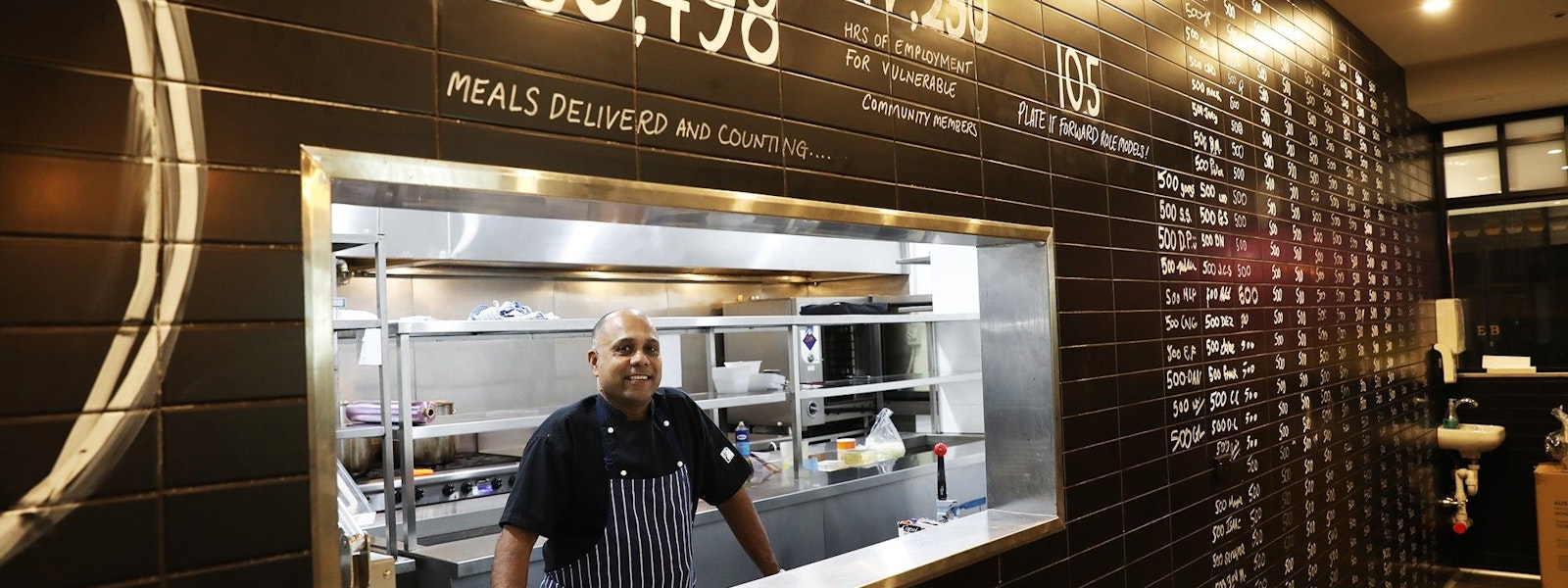
Published Oct 2024
Working in the impact economy
The impact economy is a rapidly evolving space that offers diverse opportunities to create positive change. This section delves into ideas and approaches that are relevant to social enterprise AND to others contributing to a new economy that puts people and planet first. From exploring power dynamics and decolonisation to thinking in systems and engaging communities, these resources will provide you with a broader view and equip you to make a meaningful impact through your work.
The different faces of social enterprise
This is an introduction to the diverse landscape of social enterprises, exploring various models such as non-profits, cooperatives, for-purpose businesses, and more. Through curated resources we aim to provide readers with an understanding of the many forms social enterprises can take and the various challenges and opportunities that different approaches present.
Resources
-1.png?w=192)
'Business for good: the size and economic contribution of social enterprise in Australia', Social Enterprise Australia
This report by Social Enterprise Australia reveals that 12,033 social enterprises contribute $21.3 billion to Australia’s economy, employing over 206,000 people.
'Business for good: the size and economic contribution of social enterprise in Australia', Social Enterprise Australia.png?w=192)
The State of Social Enterprise
This report from the World Economic Forum’s Global Alliance for Social Entrepreneurship provides an overview of the social enterprise sector worldwide. It highlights key trends, challenges, and opportunities, and calls for stronger ecosystems, supportive policy, and increased investment to help social enterprises grow and scale their impact.
The State of Social Enterprise.png?w=192)
'The amazing world of our thriving co-operatives, especially in the regions’, The Fifth Estate
Community-owned cooperatives are growing in regional Australia, particularly in Victoria, as innovative responses to market failures and threats to local businesses. By providing essential services and reinvesting profits locally, examples such as Yackandandah Community Development Company (YCDCo) and renewable energy projects demonstrate their impact. These models prioritise community ownership, resilience, and local economic benefits, yet are underrepresented in mainstream business education. The article examines their increasing adoption and potential to address community needs effectively.
'The amazing world of our thriving co-operatives, especially in the regions’, The Fifth Estate.png?w=192)
‘B Corps Bring Purpose and Profit for Sustainable Business’, Sustainability Mag
Certified B Corporations (B Corps) are redefining business success by proving financial performance and social responsibility can coexist. A recent B Lab white paper highlights how B Corps outperformed traditional businesses during 2019–2021, demonstrating resilience, stronger revenue growth, and higher job retention. Their stakeholder governance model, which balances the interests of employees, communities, the environment, and shareholders, is key to their success. This article explores the impact and growing influence of B Corps in modern business.
‘B Corps Bring Purpose and Profit for Sustainable Business’, Sustainability Mag.png?w=192)
‘How social entrepreneurship works’, Sally Osberg and Roger Martin
This article by Sally Osberg and Roger Martin examines how social entrepreneurs drive systemic change, highlighting Andrea and Barry Coleman’s Riders for Health. By addressing transportation gaps in African healthcare, the Colemans exemplify how leveraging expertise and engaging stakeholders can create sustainable impact. The authors argue that successful social entrepreneurs focus on specific needs while aligning broader ecosystems, enabling transformative change that goes beyond business-driven outcomes.
‘How social entrepreneurship works’, Sally Osberg and Roger MartinWant to browse more resources?
See all resourcesThe impact economy
Here, we explore the impact economy – what it is, its key components, and the different perspectives and movements that seeking to bring about a more sustainable and just economic system. We'll explore current trends and opportunities in the growing impact economy, providing insights into how individuals and organisations can navigate and contribute to this dynamic field.
Resources

Indigenous Knowledge Research Publications – Old Ways, New First Nations
This collection of research publications from Old Ways, New explores Indigenous knowledge systems and how they inform modern technologies, design, governance and cultural practice. The work highlights Indigenous perspectives on artificial intelligence, patterns of knowledge, equity, inclusion and deep connections to Country. The resource brings together reports, papers, chapters and research outputs that centre Indigenous expertise and guide ethical engagement with complex systems.
Indigenous Knowledge Research Publications – Old Ways, New.png?w=192)
Tanya Egerton Interview – First Nations Enterprises and Cultural Heritage First Nations
This interview with Tanya Egerton explores how First Nations enterprises preserve heritage and culture for future generations. Tanya discusses the role of Indigenous-led businesses in protecting language, knowledge, art and connection to Country. The article highlights opportunities and challenges for Indigenous entrepreneurs and explains how cultural values guide economic activity. It helps readers understand why strong Indigenous enterprises support long-term community wellbeing.
Tanya Egerton Interview – First Nations Enterprises and Cultural Heritage.png?w=192)
'Core Concepts of Doughnut Economics’, Kate Raworth
This video introduces Doughnut Economics, a framework by economist Kate Raworth that balances human needs with planetary health. Challenging traditional growth-focused economics, it emphasises well-being within ecological limits. The concept offers a compelling perspective on sustainable development and highlights the role of social enterprises in the impact economy, engaging stakeholders effectively.
'Core Concepts of Doughnut Economics’, Kate Raworth.png?w=192)
‘Introducing the Impact Economy’, Griffith Centre for Systems Innovation
This article introduces the 'impact economy', a model integrating social, environmental, and economic outcomes. It explores its definition, relevance in the Anthropocene era, and components like impact-driven business, investment, and trade. Key topics include political leadership, innovation, impact measurement, and challenges such as inclusion and new economic indicators. A valuable primer for understanding how reshaped economic systems can address global challenges and better serve people, places, and the planet.
‘Introducing the Impact Economy’, Griffith Centre for Systems Innovation.png?w=192)
‘Do you know all 17 SDGs?’, United Nations
This article provides a concise overview of the 17 Sustainable Development Goals, promoting prosperity while safeguarding the planet. These goals emphasise poverty eradication, economic growth, social equity, and environmental protection to address global challenges effectively.
‘Do you know all 17 SDGs?’, United Nations.png?w=192)
‘Earth for All: A Survival Guide for Humanity - Executive Summary’, Earth4All
Earth4All’s two-year research investigates pathways to achieve global wellbeing within planetary boundaries by 2100. It examines two scenarios: ‘Too Little Too Late,’ continuing current economic policies, and ‘Giant Leap,’ requiring bold decisions and investments. The report identifies five critical turnarounds—poverty, inequality, women’s empowerment, food systems, and energy transformation—and calls for active governments, wellbeing economies, and urgent action this decade. Using system dynamics models, it highlights affordable economic shifts and proposes citizens’ assemblies to overcome political barriers.
‘Earth for All: A Survival Guide for Humanity - Executive Summary’, Earth4All.png?w=192)
‘The ReGeneration Rising’, RSA Oceania
The ReGeneration Rising podcast, by RSA Oceania, explores regenerative approaches to redesigning communities, cities, and economies, fostering a thriving planet. Hosted by Dr Daniel Christian Wahl, it features renowned guests across two insightful series.
‘The ReGeneration Rising’, RSA Oceania.png?w=192)
'Legacy: how to build the sustainable economy', Dieter Helm
Dieter Helm’s video lecture series examines the steps needed for a sustainable economy, addressing polluter responsibility, resource maintenance, and investment, with detailed insights, downloadable slides, and an accompanying book.
'Legacy: how to build the sustainable economy', Dieter Helm
CSI Social Impact - Research for Social Impact
The Research for Social Impact Podcast from the Centre for Social Impact (CSI) Swinburne features researchers, practitioners and students discussing social entrepreneurship, finance, impact measurement, innovation and employment reform, offering deep insights into Australia’s social purpose ecosystem.
CSI Social Impact - Research for Social Impact
Seed to Table
The Seed to Table podcast explores the stories of Australians working to revitalise our food and farming systems.
Seed to Table
Wisdom & Action
The Wisdom & Action Podcast by Small Giants Academy features host Berry Liberman in dialogue with global thinkers, exploring how to transform wisdom into meaningful interventions that address systemic challenges and shape a hopeful future.
Wisdom & Action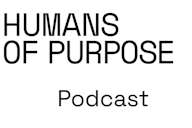
Humans of Purpose
The Humans of Purpose Podcast features weekly conversations with purpose-driven leaders exploring impact, purpose and meaningful work. Hosted by Mel Greblo, each episode brings insight into leadership, systems change and community-centred innovation.
Humans of Purpose
The Announcement
The Announcement is a documentary podcast series hosted by Matt Barr that delves into Patagonia’s radical 2022 decision to make “Earth” its only shareholder, exploring legacy, purpose and capitalism’s evolving role.
The Announcement
Remarkable Insights Podcast
The Remarkable Insights Podcast by Remarkable explores how disability drives innovation, featuring global pioneers in assistive tech and inclusive design. Hosted by Viv Mullan, each episode reveals how lived experience and creativity shape business, technology and social change
Remarkable Insights Podcast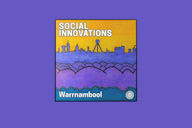
Silver Ball Social Innovations: Warrnambool
Silver Ball Social Innovations: Warrnambool is a new podcast commissioned by the Fletcher Jones Family Foundations. It spotlights six local social enterprises creating lasting community impact. Through uplifting and inspiring stories, the series showcases grassroots innovation, creativity and connection across Warrnambool’s social enterprise ecosystem.
Silver Ball Social Innovations: Warrnambool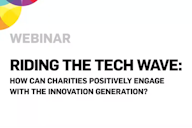
Riding the Tech Wave: How Charities Can Positively Engage with the Innovation Generation
This article highlights how charities can connect with a new generation of tech founders who are becoming major donors in Australia. Drawing on the Australian Tech Giving Report, it explains how tech wealth is growing, why tech givers give differently, and how not-for-profits can adapt to engage them.
Riding the Tech Wave: How Charities Can Positively Engage with the Innovation Generation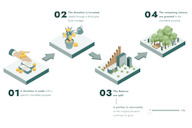
Awqaf: A 1,000-year-old blueprint for modern impact investing
This article explains 'awqaf', an ancient Islamic endowment model that funds public good, and why it might help shape modern impact investing in Australia. It describes how awqaf protect the original donation, provide ongoing community benefits, and invest ethically, offering new ways to support lasting social impact.
Awqaf: A 1,000-year-old blueprint for modern impact investing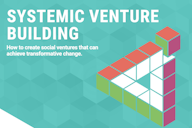
Systemic Venture Building - How to create social ventures that can achieve transformative change
Systemic Venture Building explains how new businesses can be designed to change entire systems, not just solve isolated problems. Developed by Metabolic, this approach focuses on creating multiple, connected ventures that work together to shift industries like energy, food and materials towards long-term social and environmental impact.
Systemic Venture Building - How to create social ventures that can achieve transformative change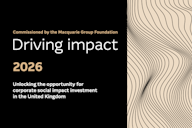
Driving impact 2026 Unlocking the opportunity for corporate social impact investment in the United Kingdom
This report explores how companies can use social impact investment to support charities and social enterprises while creating lasting social value. It explains what corporate social impact investment is, why uptake remains low in the UK, and what organisations can do to overcome barriers and unlock impact-first funding models.
Driving impact 2026 Unlocking the opportunity for corporate social impact investment in the United KingdomWant to browse more resources?
See all resourcesPower, decolonisation and self-determination
Here we explore some of the critical issues of power dynamics, historical injustice, and privilege. We consider strategies for decolonising practice and enabling self-determination. We also explore concepts of community wealth-building and community-led governance.
Resources
.png?w=192)
'Power Dynamics: A Systemic Inquiry', Anna Birney (School of System Change)
This blog delves into power through a systems change lens, emphasising its importance in tackling sustainability challenges. It redefines power as a relational dynamic rather than a static state, exploring shifts from “power over” to “power with” approaches. Key themes include privilege, systemic challenges like climate change and inequality, and the fractal nature of power across scales. Combining theoretical insights with practical strategies, it provides tools for minimising hierarchical power, fostering collaboration, and building capacity for transformative, inclusive decision-making.
'Power Dynamics: A Systemic Inquiry', Anna Birney (School of System Change).png?w=192)
'Aboriginal Economics', Gaala Watson (Sustainable Table) First Nations
This article examines Indigenous perspectives on economics and self-determination in Australia, highlighting historical dispossession, economic exclusion, and alternative frameworks for wealth. It explores Indigenous values of communal wealth, economic sovereignty tied to land and spirit, and sustainable solutions.
'Aboriginal Economics', Gaala Watson (Sustainable Table).png?w=192)
Indigenous Governance Toolkit First Nations
The AIGI Indigenous Governance Toolkit supports Aboriginal and Torres Strait Islander organisations to build strong and culturally grounded governance. It provides practical tools, case studies, and guidance to help communities strengthen leadership, decision-making, and accountability while respecting culture, tradition and self-determination.
Indigenous Governance Toolkit.png?w=192)
‘Understanding Power Dynamics in Society Explained’, Julia Cha
This video examines how societal power dynamics—capitalism, patriarchy, and racism—shape behaviours, leadership, and business outcomes. It explores healing power structure wounds, aligning leadership with values, and empowering individuals through self-awareness and systemic change.
‘Understanding Power Dynamics in Society Explained’, Julia Cha.png?w=192)
‘Are We Mates Yet? Agreement-Making Between States and First Nations’, Dr. Tony Dreise First Nations
This report analyses colonial impacts, truth-telling, and pathways to self-determination, offering insights into decolonisation. While focused on agreement-making between Australian states and First Nations peoples, its strategies for embedding equity and Indigenous sovereignty into governance, policy, and community development have broader relevance.
‘Are We Mates Yet? Agreement-Making Between States and First Nations’, Dr. Tony Dreise.png?w=192)
‘An Introduction to Community Wealth Building', Ethical Fields
This Ethical Fields guide explores community wealth building as a transformative approach to creating equitable, resilient local economies. It highlights principles like local ownership, democratic participation, and wealth redistribution, alongside practical strategies for stakeholders to implement this model in Australia.
‘An Introduction to Community Wealth Building', Ethical Fields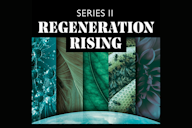
‘Making Embassy with Tyson Yunkaporta’, Regeneration Rising, Season 2 Episode 11 First Nations
Discover Tyson Yunkaporta’s concept of “making embassy,” which fosters respectful, reciprocal, and meaningful relationships between people, groups, and systems. Rooted in Indigenous cultural practices, it emphasises relationality, shared purpose, cultural respect, and adaptability. Explore how this dynamic approach creates spaces for dialogue, collaboration, and the intersection of diverse knowledge systems.
‘Making Embassy with Tyson Yunkaporta’, Regeneration Rising, Season 2 Episode 11Want to browse more resources?
See all resourcesThinking and working in systems
Systems thinking is an approach for understanding and working with complex challenges. Here, we’ll introduce the concept of systems thinking and its relevance for social enterprises. We'll explore frameworks that can help us navigate complex systems, as well as approaches for designing and implementing interventions that drive lasting change.
Resources

First Nations Systems Thinking – Common Ground First Nations
This article explains systems thinking from Aboriginal and Torres Strait Islander perspectives. It shows how First Nations approaches view the world as connected relationships between people, land, culture and community. The resource introduces key ideas from Indigenous knowledge systems and compares them with Western problem solving methods. It helps readers understand why Indigenous ways of thinking are valuable for addressing complex Australian challenges.
First Nations Systems Thinking – Common Ground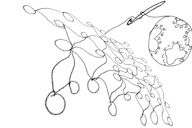
Indigenous Knowledge Systems Lab – Deakin University First Nations
The Indigenous Knowledge Systems Lab (IKS Lab) is a research and public-facing platform centred on Indigenous ways of thinking, knowing and doing. It brings together Indigenous practitioners and researchers to explore how Indigenous knowledge systems can inform complex global issues, policy, design and culture. The Lab creates space for relational, respectful approaches to research, knowledge sharing and collaboration across disciplines.
Indigenous Knowledge Systems Lab – Deakin University
'The Complexity Spectrum', Rob Ricigliano
Systems change offers a way to address complex social issues like poverty and homelessness by moving beyond traditional, linear problem-solving. This blog contrasts ‘clock’ problems, which are solvable with structured solutions, with ‘cloud’ problems, requiring ongoing adaptations. It emphasises the need to shift from quick fixes to fostering resilience, healing relationships, and supporting long-term system health to address deep-rooted challenges effectively.
'The Complexity Spectrum', Rob Ricigliano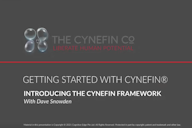
'The Cynefin Framework - A Leader's Framework for Decision Making and Action', David Snowden
The Cynefin Framework guides leaders in matching actions to context by distinguishing different domains. It enables sense-making, helping leaders identify true complexity and respond effectively to challenges.
'The Cynefin Framework - A Leader's Framework for Decision Making and Action', David Snowden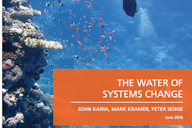
'The Water of Systems Change', FSG
This framework highlights how to create sustainable social impact by addressing systemic factors that maintain social and environmental challenges. It introduces three levels of systems change—structural, relational, and transformative—emphasising the importance of shifting policies, power dynamics, and deep-seated beliefs. By engaging at all levels, organisations can drive meaningful, lasting change that is resilient, inclusive, and adaptable.
'The Water of Systems Change', FSG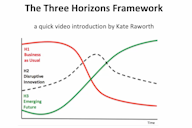
'Three Horizons Framework', Bill Sharpe
The ‘Three Horizons Framework’, developed by Bill Sharpe, is a strategic tool for managing long-term transformation. It maps three phases of change—current systems (Horizon 1), visionary futures (Horizon 3), and the transition zone (Horizon 2)—helping organisations navigate innovation and address emerging challenges. Widely used in future thinking and strategic planning, the framework offers practical steps for bridging the present with transformative visions.
'Three Horizons Framework', Bill Sharpe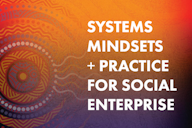
'Systems Mindsets & Practice for Social Enterprise', Social Enterprise World Forum 2022
This resource explores the importance of systems thinking in social enterprise, advocating for interconnected approaches to tackle complex challenges. It introduces key practices, including adopting pluralistic perspectives, fostering collaborative networks, and addressing systemic issues through targeted interventions. By focusing on relationships, complexity, and leverage points, social enterprises can drive meaningful change while balancing specific actions with broader systemic goals.
'Systems Mindsets & Practice for Social Enterprise', Social Enterprise World Forum 2022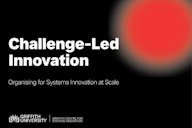
'Challenge-led Innovation: Organising for Systems Innovation at Scale', Griffith Centre for System Innovation (2023)
This resource introduces Challenge-Led Innovation (CLI) as a framework to address complex, large-scale challenges like climate change and inequality. Based on ‘Mission-oriented’ approaches developed by Mariana Mazzucato at UCL IIPP, CLI moves away from traditional innovation models by focusing on collaborative, mission-driven efforts across sectors and communities.
'Challenge-led Innovation: Organising for Systems Innovation at Scale', Griffith Centre for System Innovation (2023)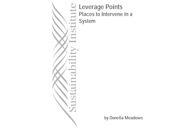
'Leverage Points: Places to Intervene in a System', Donella Meadows
This foundational paper by Donella Meadows introduces 12 leverage points within systems where small interventions can drive significant change. It highlights the potential of paradigm shifts in addressing complex challenges, while acknowledging the resistance systems often present to such transformations.
'Leverage Points: Places to Intervene in a System', Donella Meadows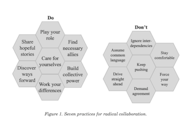
'Radical Collaboration to Transform Social Systems', Adam Kahane
This article by Adam Kahane introduces ‘radical collaboration’ as a transformative approach to tackling systemic challenges. By integrating love, power, and justice, it fosters empathy, empowerment, and fairness among diverse stakeholders. This method aims to align differing interests and capacities, enabling inclusive and impactful systems change while navigating inherent tensions in collaboration.
'Radical Collaboration to Transform Social Systems', Adam Kahane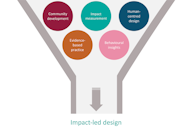
Impact-led design 2.0
Impact-led design 2.0 is a way to create programs and projects that are built around the change we want to see, not just around funding or activity. It uses evidence, lived experience, co-design and systems thinking to make solutions stronger and more effective across sectors such as government, philanthropy, business and not-for-profits.
Impact-led design 2.0
Systemic Venture Building - How to create social ventures that can achieve transformative change
Systemic Venture Building explains how new businesses can be designed to change entire systems, not just solve isolated problems. Developed by Metabolic, this approach focuses on creating multiple, connected ventures that work together to shift industries like energy, food and materials towards long-term social and environmental impact.
Systemic Venture Building - How to create social ventures that can achieve transformative changeWant to browse more resources?
See all resourcesEthical leadership
Here, we explore the principles and practices of ethical leadership, focusing on balancing impact, judgement, and personal values. Through the resources provided, we'll discuss how to cultivate a culture of integrity, transparency, and accountability within organisations and communities.
Resources
-1.png?w=192)
'What is Ethical Leadership and Why is it Important?', Harvard Professional and Executive Education
This blog introduces the concept of ethical leadership, where decisions prioritise integrity, societal impact, and the common good. It outlines six key principles—respect, accountability, service, honesty, justice, and community—that foster trust, equity, and collaboration in leadership practices.
'What is Ethical Leadership and Why is it Important?', Harvard Professional and Executive Education.png?w=192)
'Why Inclusive Leaders Are Good for Organisations, and How to Become One', Harvard Business Review
This article explores inclusive leadership, which fosters belonging, psychological safety, and respect within diverse teams. It highlights six traits—commitment, humility, bias awareness, curiosity, cultural intelligence, and collaboration—demonstrating how inclusive leaders drive team performance, decision-making, and collaboration through consistent behaviours.
'Why Inclusive Leaders Are Good for Organisations, and How to Become One', Harvard Business Review.png?w=192)
'A Guide to Adaptive Leadership', Acumen Academy
This guide introduces adaptive leadership, empowering individuals to lead without formal authority. It explores core principles, distinguishing adaptive challenges from technical problems, and practical steps like shifting perspectives, framing challenges, and fostering collaboration. Additional resources and free courses are included.
'A Guide to Adaptive Leadership', Acumen Academy.png?w=192)
'Indigenous Leadership in Business', University of Sydney First Nations
This video series explores 'Indigenous Leadership in Business,' highlighting themes of collective leadership, stewardship, relationships, community benefit, and cultural responsibility to inspire empowerment and transformative change.
'Indigenous Leadership in Business', University of Sydney-1.png?w=192)
'Seven Transformations of Leadership', Harvard Business Review
This framework categorises leadership into seven stages, from Opportunist to Alchemist, reflecting increasing complexity and transformative impact. Each stage highlights unique approaches to challenges, relationships, and organisational goals. Leaders can progress through feedback, self-reflection, and embracing new responsibilities, with growth beyond the Achiever stage requiring deep self-awareness and the ability to challenge assumptions. Teams led by Strategists are most adaptable, benefiting from diverse perspectives and innovation to navigate complex challenges and drive organisational transformation effectively.
'Seven Transformations of Leadership', Harvard Business Review-1.png?w=192)
'The Ones Who Walk Away From Omelas', Ursula K LeGuin
Ursula K. LeGuin’s The Ones Who Walk Away from Omelas explores ethical dilemmas, moral boundaries, and collective responsibility. This powerful story serves as a lens for leaders facing difficult choices between systemic stability and moral courage, prompting reflection on individual rights, collective good, and principled action.
'The Ones Who Walk Away From Omelas', Ursula K LeGuinWant to browse more resources?
See all resourcesParticipatory approaches
Engaging stakeholders, beneficiaries, and communities in decision-making is essential for fostering equitable and lasting change. Here, we examine the importance of participatory approaches, highlighting methods for involving diverse perspectives and ensuring shared ownership of strategies and actions.
Resources
.png?w=192)
How to revive a neighborhood: with imagination, beauty and art
Theaster Gates is a potter and community leader who shares how he transformed empty, run-down buildings into places where people can connect and create. In this talk, he shows how to see problems as opportunities, start with what you already have, and use art and culture to bring communities together and create positive change.
How to revive a neighborhood: with imagination, beauty and art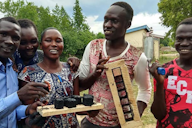
Co-Creating a More Equitable World: The Transformative Benefits of Participatory Design, MIT D-Lab
This MIT D-Lab article introduces participatory design as a powerful approach to fostering equity and creating sustainable solutions by engaging end-users as co-creators. It explores the benefits of building skills, trust, and ownership while producing durable, context-specific outcomes. By tailoring methods to different challenges, participatory design promotes inclusivity and addresses systemic inequities.
Co-Creating a More Equitable World: The Transformative Benefits of Participatory Design, MIT D-Lab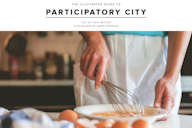
'The Illustrated Guide to Participatory City', Britton and Anderson
This guide introduces the Participatory City model, designed to create vibrant, inclusive neighbourhoods through active resident engagement in practical projects. It offers principles, methods, and insights for addressing social challenges and building community resilience, serving as a valuable resource for policymakers, community leaders, and organisations.
'The Illustrated Guide to Participatory City', Britton and Anderson
A Guide to Selecting Participatory Research Methods Based on Project and Partnership Goals, Journal of Participatory Research Methods
This guide explores participatory research methods designed to align with collaborative project and partnership goals. By involving communities throughout the research process, it promotes equity, trust, and relevance. With actionable frameworks for co-production, it supports researchers and organisations in integrating community knowledge, enhancing outcomes, and fostering long-term collaboration. The guide categorises methods into five domains—engagement, exploration, visual and narrative, mobilisation, and evaluation—while addressing both the strengths and challenges of participatory approaches.
A Guide to Selecting Participatory Research Methods Based on Project and Partnership Goals, Journal of Participatory Research Methods-2.png?w=192)
'Participatory Budgeting: Meaning, Benefits & A Step-by-Step Guide', Delib
This article introduces participatory budgeting, a democratic process empowering citizens to influence public fund allocation. It covers its origins in Porto Alegre, Brazil, outlines key stages, and highlights benefits like transparency, trust, and community empowerment, making it an ideal resource for those exploring the concept.
'Participatory Budgeting: Meaning, Benefits & A Step-by-Step Guide', Delib
Impact-led design 2.0
Impact-led design 2.0 is a way to create programs and projects that are built around the change we want to see, not just around funding or activity. It uses evidence, lived experience, co-design and systems thinking to make solutions stronger and more effective across sectors such as government, philanthropy, business and not-for-profits.
Impact-led design 2.0Want to browse more resources?
See all resourcesWellbeing - for you and others
Personal and collective wellbeing is a critical factor in the social enterprise sector. This section covers strategies for maintaining mental health and work-life balance while pursuing social impact, as well as approaches to fostering wellbeing within the communities and stakeholders that social enterprises serve.
Resources
-9.png?w=192)
'The Community Well', Benefolk Foundation
The Community Well, also known as the Social Sector Wellbeing and Resilience Hub, is an online resource designed to support charities, not-for-profits, and social enterprises. Created to address stress and burnout in the social sector, it offers curated tools, practical strategies, and advocacy for systemic change, fostering sustainable mental health and resilience practices.
'The Community Well', Benefolk Foundation-11.png?w=192)
‘Boundaries, Burnout, and the ‘Goopification’ of Self-Care’, The Ezra Klein Show, featuring Dr. Pooja Lakshmin
This podcast delves into the evolution of self-care from a radical feminist concept to a commercialised wellness industry, exploring why this shift has failed to curb rising burnout rates. Featuring Dr. Pooja Lakshmin, it challenges superficial wellness trends and offers practical, values-based strategies to redefine self-care for personal and collective empowerment.
‘Boundaries, Burnout, and the ‘Goopification’ of Self-Care’, The Ezra Klein Show, featuring Dr. Pooja Lakshmin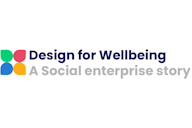
Design for Wellbeing: A Social Enterprise Story
This resource showcases findings from Australian Research Council studies on Work Integration Social Enterprises (WISE). It emphasises the role of social enterprises in enhancing individual and community wellbeing, particularly in disadvantaged and regional areas. The platform offers tools, insights, and strategies for social enterprises, policymakers, and ecosystem supporters to design workplaces and practices that integrate wellbeing principles, address systemic disadvantage, and foster resilience. Key focus areas include regional community wellbeing, youth health equity, and leveraging organisational design to influence positive social outcomes.
Design for Wellbeing: A Social Enterprise Story-12.png?w=192)
‘What Is Psychological Safety?', McKinsey
Psychological safety is crucial for innovation, teamwork, and organisational success. This article highlights its role in fostering inclusive and high-performing cultures. It outlines leadership strategies to build trust, such as open dialogue, curiosity, and equitable participation. Learn how consultative, supportive, and challenging leadership styles enhance team resilience, creativity, and productivity, particularly in remote and hybrid work environments.
‘What Is Psychological Safety?', McKinsey-15.png?w=192)
'Cultural Safety in Australia: Discussion Paper', Lowitja Institute First Nations
Cultural safety is pivotal for achieving equity and inclusion in health and human services. This paper focuses on embedding cultural safety into systems for Aboriginal and Torres Strait Islander peoples, addressing systemic racism and power imbalances. While primarily health-focused, its insights are applicable across sectors like social enterprise, community development, and governance.
'Cultural Safety in Australia: Discussion Paper', Lowitja Institute-17.png?w=192)
Inner Development Goals (IDGs): A Framework for Personal and Collective Growth
The ‘Inner Development Goals (IDGs)’ framework outlines 23 essential skills and qualities to foster personal growth, leadership, and systemic change, enabling individuals and organisations to better address global challenges like the United Nations’ Sustainable Development Goals (SDGs).
Inner Development Goals (IDGs): A Framework for Personal and Collective Growth
Wellbeing Matters Guide
The "Wellbeing Matters Guide" offers insights from social enterprise leaders, particularly in regional, rural, and remote areas. It provides resources to support leaders in enhancing their wellbeing and effectiveness by sharing real-life experiences.
Wellbeing Matters GuideWant to browse more resources?
See all resourcesTechnology for Good
Technology has the potential to amplify impact, from improving service delivery to enabling new forms of collaboration and innovation. Here, we explore technology that can be harnessed for good and how exponential technologies are likely to shape the world around us. The resources we share will also highlight important considerations for ethical and inclusive technology development and deployment in the social enterprise context.
Resources
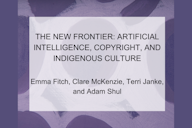
Artificial Intelligence, Copyright and Indigenous Culture – The New Frontier First Nations
This article by Terri Janke and Company explores the impact of artificial intelligence on copyright law and Indigenous culture in Australia. It explains how AI technologies raise new risks for protecting Indigenous Cultural and Intellectual Property. The resource discusses ownership, consent, and the use of Indigenous art and knowledge in AI systems. It encourages readers to consider ethical and legal safeguards as digital tools expand.
Artificial Intelligence, Copyright and Indigenous Culture – The New Frontier.png?w=192)
Connecting Up (Infoxchange)
Connecting Up helps Australian and New Zealand nonprofits strengthen their organisations through technology. This free platform, run by Infoxchange, offers discounted IT products, cloud services, hardware, software, and training by partnering with leading tech companies to empower social impact organisations.
Connecting Up (Infoxchange)
Can Exponential Growth Save a Finite Planet? Cleaning Up Ep187: Azeem Azhar
This episode of the "Cleaning Up" podcast features Azeem Azhar, founder of Exponential View, discussing the role of exponential technologies like AI, renewable energy, and battery storage in addressing climate challenges. The conversation explores sustainable energy strategies, investments in cleaner energy, and the balance between technological progress and environmental stewardship.
Can Exponential Growth Save a Finite Planet? Cleaning Up Ep187: Azeem Azhar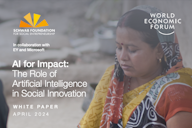
AI for Impact: The Role of Artificial Intelligence in Social Innovation, Schwab Foundation for Social Entrepreneurship
This report by the Schwab Foundation, EY, and Microsoft explores AI’s transformative role in global social innovation. Drawing on insights from 300 social innovators across 50 countries, it highlights AI’s impact on healthcare, environmental sustainability, and economic empowerment. The report examines barriers to adoption, opportunities for scalable solutions, and ethical considerations, offering case studies and practical guidance for leveraging AI responsibly to address societal challenges.
AI for Impact: The Role of Artificial Intelligence in Social Innovation, Schwab Foundation for Social Entrepreneurship-5.png?w=192)
AI for Impact: The PRISM Framework for Responsible AI in Social Innovation, Schwab Foundation for Social Entrepreneurship
This report introduces the ‘PRISM Framework,’ a guide for responsibly integrating AI into social innovation. Developed with EY and Microsoft, it offers pathways for organisations at various AI adoption stages. The framework aligns AI with impact goals, highlights scalable approaches, and addresses key considerations like ethics, data security, and transparency.
AI for Impact: The PRISM Framework for Responsible AI in Social Innovation, Schwab Foundation for Social Entrepreneurship-7.png?w=192)
Web3 for 2030: How Can Web3 Help Achieve the Sustainable Development Goals?, UNDP, 2022
This UNDP report examines how Web3 technologies like blockchain and decentralised finance can drive social innovation and support the Sustainable Development Goals (SDGs). It provides an accessible overview of Web3, highlights its potential for systemic change in areas like finance and governance, and addresses key adoption challenges, including digital exclusion and environmental concerns.
Web3 for 2030: How Can Web3 Help Achieve the Sustainable Development Goals?, UNDP, 2022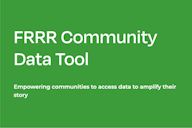
FRRR Community Data Tool
The FRRR Community Data Tool is a free online resource that helps local community groups find reliable information about their area. By entering a location, users can quickly access population figures, socio-economic data and regional indicators to support planning, applications for grants and telling their community’s story with strong evidence.
FRRR Community Data ToolWant to browse more resources?
See all resourcesComing soon
Understorey points to a range of quality resources that already exist across the sector: practical guides, tools, reports, case studies, and proven frameworks. We’re bringing them together in one place to make it easier for everyone to learn and exchange about social enterprise.
Do you know of a great resource we should include?

We’d love to hear from you!
Reach out to one of our team members, and share input and ideas about how we can evolve Understorey.
Get in touch